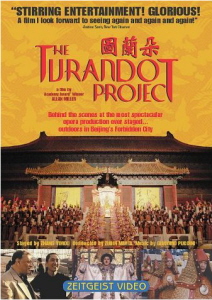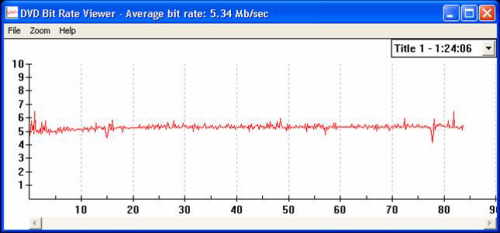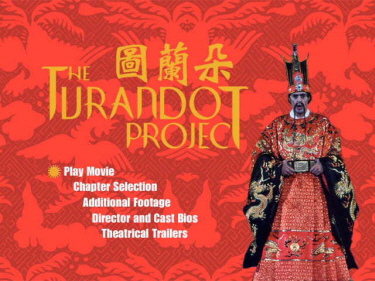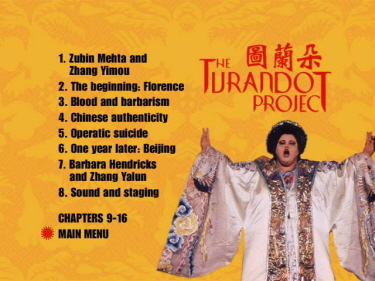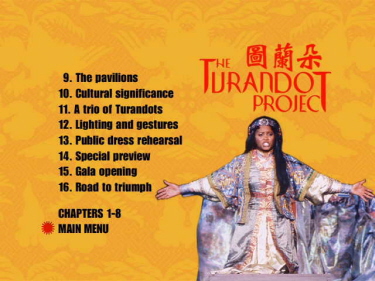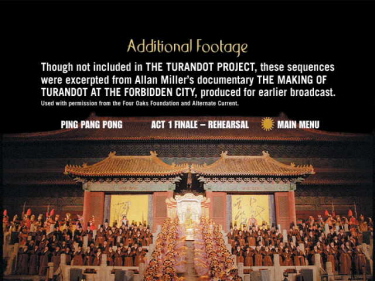![]()
![]()

![]()
![]()
|
Search DVDBeaver |
S E A R C H D V D B e a v e r |

directed by Allan Miller
USA 2000
“I didn’t know Zhang Yimou’s name, but I
had seen ‘Raise the Red Lantern’. I said, ‘Why don’t we get that guy?’”
--Zubin Mehta, conductor
|
Right now, director Zhang Yimou is the most-esteemed contemporary Chinese
director. Unlike Chen Kaige, who has a spotty track record despite making
the masterpiece “Farewell My Concubine” as well as the excellent “The
Emperor and the Assassin” and “Together”, Zhang Yimou has directed acclaimed
movie after acclaimed movie after acclaimed movie. It seems like Zhang has
not faltered since 1990’s “Ju Dou”, though I’m of the opinion that if he and
Chen Kaige keep trying to out-do one another in making expensive, bloated
commercial fare, then Zhang Yimou will experience a terrible fall, too. |
Posters
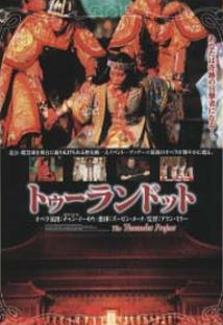 |
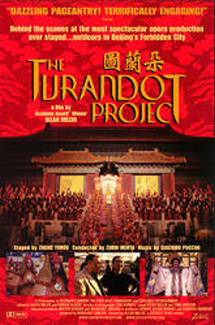 |
Theatrical Release: 11 September 2000 (Toronto Film Festival)
Reviews More Reviews DVD Reviews
DVD Review: Zeitgeist - Region 1 - NTSC
Big thanks to David McCoy for the Review!
| DVD Box Cover |
|
CLICK to order from: |
| Distribution |
Zeitgeist Region 1 - NTSC |
|
| Runtime | 84 min | |
| Video |
1.85:1 Original Aspect Ratio |
|
|
NOTE: The Vertical axis represents the bits transferred per second. The Horizontal is the time in minutes. |
||
| Bitrate |
|
|
| Audio | Dolby Digital 2.0 stereo (English, Chinese, Italian, and several other languages) | |
| Subtitles | burned-in English for non-English dialogue | |
| Features |
Release Information: Studio: Zeitgeist Aspect Ratio:
Edition Details: Chapters 16 |
|
| Comments |
Video: My guess is that director Allan Miller and his team captured footage with analog video cameras, which would explain the picture’s general lack of resolution and sharpness. Also, the DVD’s image was either taken from an interlaced source or was created as an interlaced program itself. Though not oppressively dark, the video feels as if a shadow covered everything during shooting. The video is not only non-anamorphic widescreen (1.85:1) but is also slightly windowboxed as evidenced by the black bars on the left and right. Audio: The Dolby Digital 2.0 stereo audio track is a simple, straightforward reproduction of sound that was captured “live”. As such, the participants’ voices are clear and audible when giving talking-heads interviews, but when the camera crews are recording conversations outdoors, voices can get lost in the din of every-day interactions. Music reproduction is adequate but not stellar, which is understandable given the audio environment. Extras: There are two additional video clips featuring footage shot during the production’s run in Florence. There are biographical text pages for Zubin Mehta, Zhang Yimou, and Allan Miller. Finally, there are previews for “The Turandot Project” and other Zeitgeist DVD releases. --Miscellaneous-- An insert booklet provides movie and DVD credits as well as background notes about “Turandot” the opera and chapter listings. The background notes reveal that Puccini died before he finished composing the opera. Franco Alfano completed the rest of “Turandot”, but at the opera’s premiere, conductor Arturo Toscanini ended the performance abruptly, telling the audience that he had reached the end of Puccini’s actual involvement in the project. - David McCoy |
DVD Menus
|
|
|
|
|
|
 |
 |
Screen Captures
|
|
|
|
|
|
|
|
|
|
|
|
|
|

